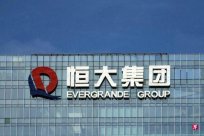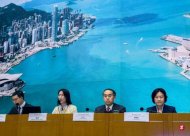Hong Kong Chief Executive Li Jiachao went to Beijing on Monday (December 18) to report on his job. As soon as the news was released, the keen media found that this duty was very different from the past.
Since the return of Hong Kong, when the Chief Executive went to Beijing to write a job, the central government generally arranged two meetings. The Premier of the State Council first heard the special report work, and then the President met with the Chief Executive.
This time, two meetings have been reduced to one game.Chinese official and prime minister Li Qiang did not meet with Li Jiachao separately. Instead, it was changed to a number of members of the Politburo Standing Committee and Politburo, a member of the Politburo, who were officially led by Chinese officials to listen to Li Jiachao's reporting work.
On the same day, Macau's special congratulatory duties also broke the convention. It also broke the convention. It reported to the President of the President at one time and no longer described the job to the Prime Minister alone.
According to the news released by Chinese official media, Chinese officials met with Li Jiachao and He Yicheng on Monday, respectively, and listened to the reports of the current situation of Hong Kong and Macau and the work of the SAR government.Li Qiang and other senior management are "participating in the meeting."
In addition to Li Qiang, the Standing Committee of the Politburo who participated in the two conferences also included the Secretary of the Central Secretariat, Cai Qi, director of the General Office, and Ding Xuexiang, deputy premier of the State Council of the Central Hong Kong and Macau Leading Group.
The two members of the Politburo who participated in the meeting were Shi Taifeng, Minister of the Central United Front Work Department, and Chen Wenqing, secretary of the Central Political and Legal Committee.In addition, Xia Baolong, director of the Central Hong Kong and Macau Work Office and director of the Hong Kong and Macau Affairs Office of the State Council, also participated in the meeting according to the convention.
This is believed to be the biggest one of the special lineups in Beijing after the return of Hong Kong and Macau.Li Jiachao said in Beijing on Monday that "the arrangement fully reflects the central government's emphasis on the chief executive's duty and the special zone work."
According to the Basic Law of Hong Kong and Macau, the Chief Executive is responsible for the Central People's Government, that is, the State Council, and the Special Administrative Region.The Hong Kong Media Star Island Daily pointed out that the new arrangement adopted today shows that the official Chinese official has established leadership status and personally grasped Hong Kong and Macao's major affairs. The Prime Minister does not need to listen to the special report work.
Prime Minister and other central seniors responsible for the work of Hong Kong and Macao work, when the President listened to the first report of the special report and "attended the meeting", is expected to become the new rules for the future of Hong Kong and Macao.This arrangement simplifies the procedure, highlights the core position of China's official position, and further reflects the changes in Chinese party and government relations after the Communist Party of China.
In order to avoid party and government regardless of the party and the government, China has promoted the separation of the party and government after the reform and opening up, so that the administrative system has more independent space. In the age of Li Peng, Zhu Rongji, Wen Jiabao, etc.Large decision -making power, especially on economic and social issues.
However, in the 10th year of the 18th year of the Communist Party of China in 2012, the Communist Party strengthened the comprehensive leadership of various fields.Write to the party constitution.The Chinese official, personal authority has been continuously strengthened in this decade, becoming a "core" set by a respected.In this process, the separation of the party and government became the past, and the power of the State Council weakened and became an executive agency.
After the 20th National Congress of the Communist Party of China last year, the CCP established the highest power agency mainly loyal, laying a person's foundation for the further changes of the leadership system.After Li Qiang served as the new Prime Minister in March this year, Zhongnanhai no longer had the "dispute between the North and South Academy", and the implementation of the State Council's implementation became stronger.
After the National Two Sessions of March, Li Qiang appeared at the Prime Minister's press conference for the first time, and mentioned the role of the State Council as a "construction team".", Turn the magnificent blueprint of the 20th to a construction drawing.
The new government has also revised the rules of work of the State Council, emphasizing the political stance of the State Council, including the decisive significance of "deep understanding 'two establishment', enhanced the four consciousness ', the four self -confidence'Two maintenance '"and so on.The new version of the work rules also highlight the positioning of the State Council to carry out the work under the leadership of the CPC Central Committee with the core of China.
This changes are also reflected in some specific trends of high -level high -levels in the past six months.In May of this year, Chinese officials went to Xiong'an New District to inspect, and Li Qiang rarely accompanied the inspection; October and November, Chinese officials were held in Nanchang and Shanghai, Jiangxi to host a symposium on the Yangtze River Economic Belt and further promoting the development symposium of the Yangtze River Delta.Li Qiang also attended the meeting.
The Prime Minister of the State Council accompanied the local inspection or attended the meeting in the past, which was extremely rare in the past.Like the changes in Hong Kong and Macau's first -duty forms, this is also the changes in the political weights of the Central Committee of the Communist Party of China and the State Council, the absolute leadership of the former, and the concentration of power, and even personally responsible for specific affairs management.
Such arrangements will make decisions and will better implement and implement it, but at the same time, it also means to bear greater responsibility for specific affairs.It is believed that "leading the party to the party" will also be a long period of Chinese political reality in the future. The current problem is how to avoid going back to the old way to "do not distinguish between the party and the government and replace the party by the party" before the reform and opening up.



